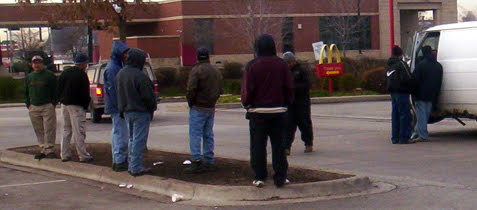IMAN and Day Laborer Campaign
By IMANCentral
For almost a year, Inner-City Muslim Action Network (IMAN) has actively mobilized around the issue of day labor in the Chicago land area. IMAN has created a network of trust and support among large circles, which includes Muslims and Latinos, through an issue that reaches the core of the inner-city community.

The Challenge of the Day Laborer…
Day laborers are workers who are employed on a task-by-task basis, and they are mainly immigrant men. Most day laborers are Mexican immigrants, while another’s tenth are from Central and South America. The majority are under 40 years of age. They work as day laborers to earn enough money to send to their families back home.
While they perform a sizeable amount of all construction-related work, their main employment includes a variety of skilled manual labor. Often, day laborers gather on street-corners, in parks, or near construction-supply stores to await employment. Eighty percent of their employers are either homeowners or subcontractors.
Because the large majority of all the day laborers are immigrants, many of the challenges they face are those of being undocumented residents. Day laborers are often discriminated against based on their race, gender, and age, and sometimes, their employers physically abuse them. It is not rare for employers to pay their workers less than the originally agreed-upon amount or to refuse to pay them all together. About half of the day laborers say they have experienced such abuse.

IMAN’s Role in the Day Laborer Campaign
A former day laborer, Abdul Rahman now works with IMAN leading the Day Laborer Campaign. He sees IMAN at the forefront of this movement. The goals of the campaign are twofold: to organize and empower day laborers and to mobilize Muslims around this issue.
Rahman says that the campaign is not simply about fighting for justice for the day laborers, but also about building trust between two very important inner-city constituencies: Latinos and Muslims. To achieve this end, IMAN has been working with many organizations, such as the South West Organizing Project (SWOP) and Union Latina, which are experienced with day laborer issues, in order to build that network of trust. The partnership has helped to break down the barriers built by stereotypes and misunderstandings between the two communities and has paved the way toward support, compassion, and solidarity.
Although about 99% of the day laborers are Latino, IMAN’s Day Laborer Campaign extends to each and every day laborer in need of assistance. “We view ourselves as members of the human community,” Rahman explains, “We struggle to help one another to confront and deal with the hardship and injustices that we face in life as well as of those who live in proximity to us.”

As a part of the campaign, IMAN seeks to create a public forum where day laborers can bring forth complaints against employers for violating their rights in the work place. So far, IMAN has retrieved over $6,000 in neglected payments on behalf of day laborers. Moreover, this campaign looks to protect the rights of day laborers by directly communicating with employers to resolve any situations and to facilitate proper payment for work. One of IMAN’s long-term goals in this campaign is to create a unique center on the Southside of Chicago to provide day laborers with much-need immigration, health, legal, and education services.
You may learn more about the efforts of the Inner-City Muslim Action Network (IMAN) at www.ImanCentral.org.
